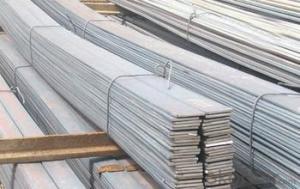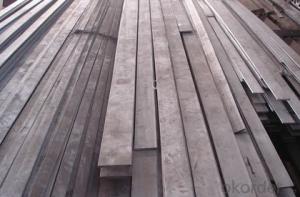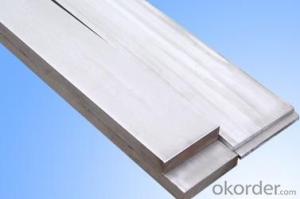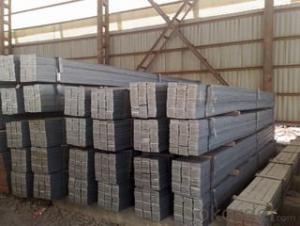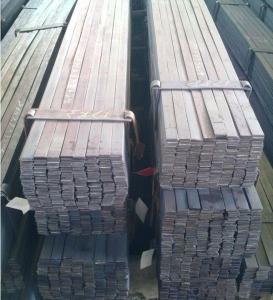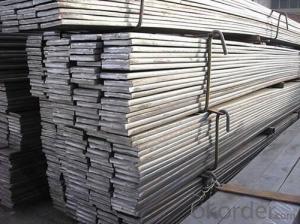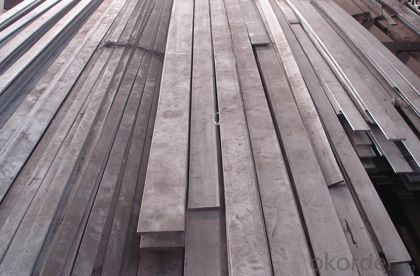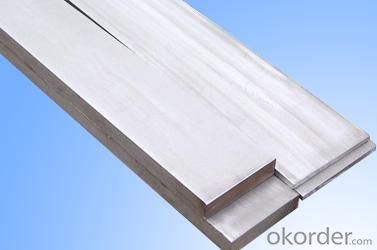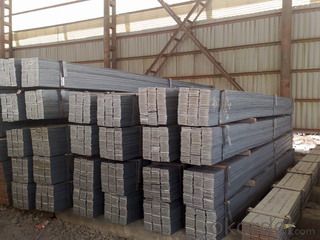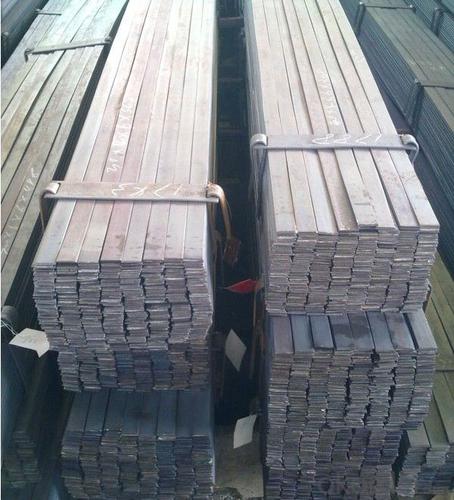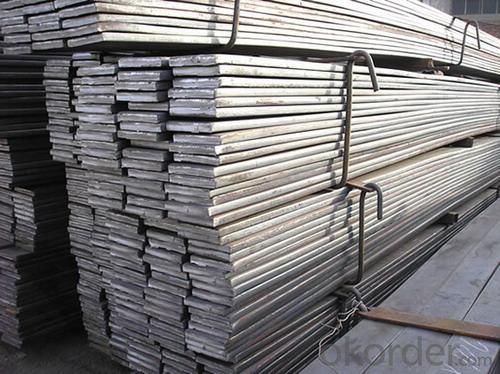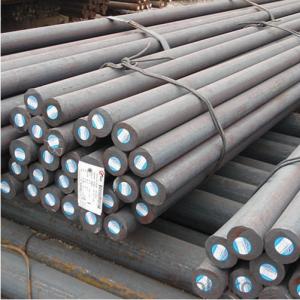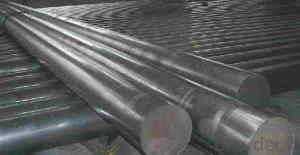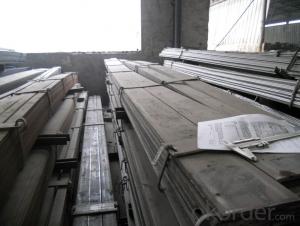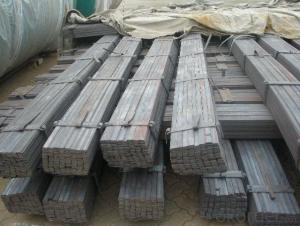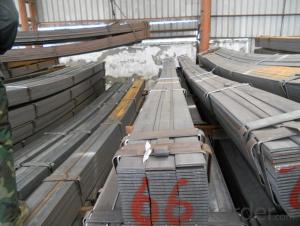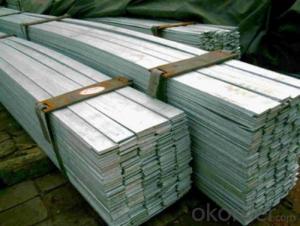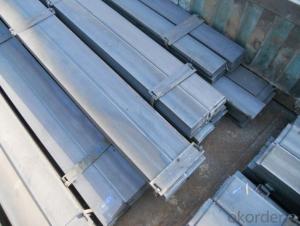Hot Rolled Grade ASTM A36_Q235 MS Steel Flat Bar
- Loading Port:
- Tianjin
- Payment Terms:
- TT OR LC
- Min Order Qty:
- 3 m.t.
- Supply Capability:
- 10000 m.t./month
OKorder Service Pledge
OKorder Financial Service
You Might Also Like
Specification
Hot Rolled Grade ASTM A36_Q235 MS Steel Flat Bar
Details of Hot Rolled Grade ASTM A36_Q235 MS Steel Flat Bar
Name | Hot Rolled Grade ASTM A36_Q235 MS Steel Flat Bar |
Shape | Flat Bar |
Standard | GB/ASTM/SAE/AISI/DIN/JIS/EN/BS |
Surface Treatment: | Black/Peeling/Polished/Machined |
Delivery Condition: | Hot Rolled or Forged/Peeled or Black Surface |
Test | SGS/UT 100% Elements Testing |
Certificate: | ISO/Mill Certificate |
Service: | 24 hours online service / |
more than 20 years trading and manufacture | |
Quality Assurance: | the third party inspection, such as SGS, BV, TUV…etc. is acceptable |
Packaging Details: | Seaworthy Packaging or as per customer's packing instruction |
steel flat bar grade | A36, Q235, Q195, SS400, St37-2 |
steel flat bar standard | GB, ASTM, AISI, EN, JIS |
steel flat bar thickness | 1.8mm-17.75mm |
steel flat bar width | 10mm-870mm |
steel flat bar length | 6m, 9m, 12m or as customer requirement |
steel flat bar technique | Slitting hot rolled steel coil |
Specification of Hot Rolled Grade ASTM A36_Q235 MS Steel Flat Bar
Width | Thickness | Length | Theoretical Weight |
(mm) | (mm) | (m) | (kg/m) |
20 | 2 | 6/9/12 | 0.31 |
20 | 2.5 | 6/9/12 | 0.39 |
20 | 2.75 | 6/9/12 | 0.43 |
25 | 2.5 | 6/9/12 | 0.49 |
25 | 3.75 | 6/9/12 | 0.74 |
30 | 2.5 | 6/9/12 | 0.59 |
30 | 3.5 | 6/9/12 | 0.82 |
30 | 9.75 | 6/9/12 | 2.3 |
40 | 3.5 | 6/9/12 | 1.1 |
40 | 4.75 | 6/9/12 | 1.5 |
40 | 11.75 | 6/9/12 | 3.69 |
50 | 2.75 | 6/9/12 | 1.08 |
50 | 4.5 | 6/9/12 | 1.77 |
50 | 9.75 | 6/9/12 | 3.83 |
60 | 5.5 | 6/9/12 | 2.6 |
60 | 7.5 | 6/9/12 | 3.53 |
60 | 11.5 | 6/9/12 | 5.42 |
80 | 5.5 | 6/9/12 | 3.45 |
80 | 7.5 | 6/9/12 | 4.71 |
80 | 11.75 | 6/9/12 | 7.38 |
100 | 3.25 | 6/9/12 | 2.55 |
100 | 4.75 | 6/9/12 | 3.73 |
100 | 7.5 | 6/9/12 | 5.89 |
120 | 9.75 | 6/9/12 | 9.18 |
120 | 11.75 | 6/9/12 | 11.07 |
150 | 9.75 | 6/9/12 | 11.48 |
150 | 11.5 | 6/9/12 | 13.54 |
150 | 13.5 | 6/9/12 | 15.9 |
160 | 11.75 | 6/9/12 | 14.76 |
200 | 9.5 | 6/9/12 | 14.92 |
250 | 5.75 | 6/9/12 | 11.28 |
340 | 7.75 | 6/9/12 | 20.68 |
CNBM Introduction of Hot Rolled Grade ASTM A36_Q235 MS Steel Flat Bar Supplier
CNBM International Corporation is the most import and export platform of CNBM group(China National Building Material Group Corporation) ,which is a state-owned enterprise, ranked in 270th of Fortune Global 500 in 2015.
With its advantages, CNBM International are mainly concentrate on Cement, Glass, Iron and Steel, Ceramics industries and devotes herself for supplying high quality series of refractories as well as technical consultancies and logistics solution.
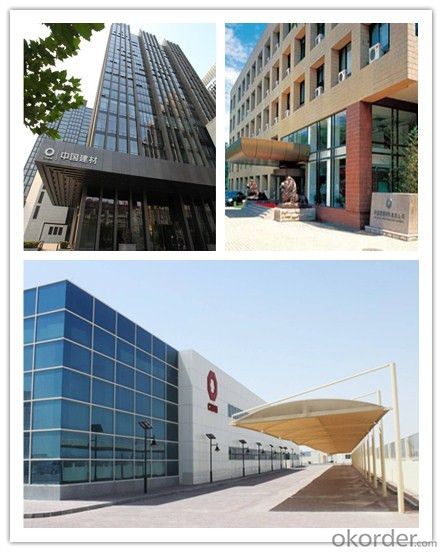
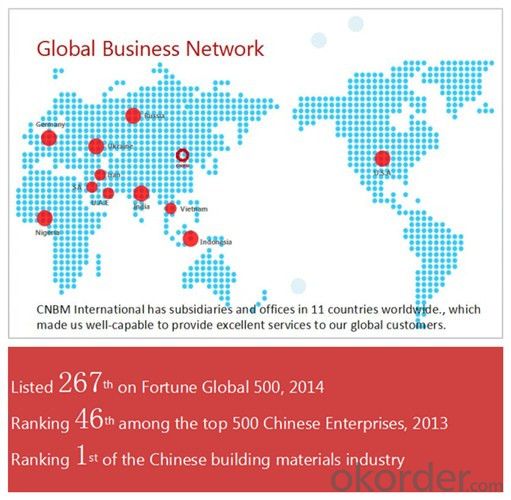
After-sale service |
|
Advantages
|
|
Packaging & Delivery Hot Rolled Grade ASTM A36_Q235 MS Steel Flat Bar Supplier
Packaging Detail | Sea worthy packing /as per customer's packing instruction |
Delivery Detail | 15 ~ 40 days after receiving the deposit |
Products Show
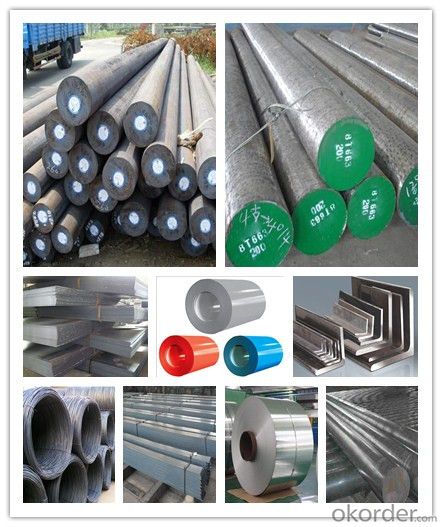
FAQ:
Are you a trading company or manufacturer? | Manufacturer |
What’s the MOQ? | 3 metric ton |
What’s your delivery time? | 15-35 days after downpayment received |
Do you Accept OEM service? | Yes |
what’s your delivery terms? | FOB/CFR/CIF |
What's the Payment Terms? | 30% as deposit,70% before shipment by T/T |
Western Union acceptable for small amount. | |
L/C acceptable for large amount. | |
Scrow ,Paybal,Alipay are also ok | |
Why choose us? | Chose happens because of quality, then price, We can give you both. Additionally, we can also offer professional products inquiry, products knowledge train (for agents), smooth goods delivery, excellent customer solution proposals. |
What's your available port of Shipment? | Main Port, China |
What’s your featured services? | Our service formula: good quality+ good price+ good service=customer's trust
|
Where are your Market? | Covering more than 160 countries in the world |
- Q: What are the different methods of surface lapping for special steel?
- There are several different methods of surface lapping for special steel. These methods are used to achieve a high level of flatness and smoothness on the surface of the steel. One common method is called free abrasive lapping. In this method, a slurry containing abrasive particles is used to polish the surface of the steel. The slurry is typically applied to a rotating lap plate, which is then pressed against the steel surface. The abrasive particles remove material from the surface, resulting in a smoother and flatter surface. Another method is called fixed abrasive lapping. In this method, a rigid lap plate with abrasive particles embedded in it is used to polish the steel surface. The lap plate is typically made of a harder material than the steel being lapped. As the lap plate rotates and is pressed against the steel surface, the embedded abrasive particles remove material, resulting in a smoother surface. Chemical lapping is another method that can be used for special steel. In this method, a chemical solution is applied to the steel surface. The chemical solution reacts with the surface of the steel, dissolving and removing a thin layer of material. This method is often used when a high level of flatness is required. Ultrasonic lapping is a method that uses ultrasonic vibrations to enhance the lapping process. In this method, the steel surface is placed in contact with a bath of abrasive particles and a liquid medium. Ultrasonic vibrations are then applied to the liquid medium, causing the abrasive particles to vibrate and remove material from the surface of the steel. This method can be particularly effective for lapping hard and brittle materials. Overall, the different methods of surface lapping for special steel offer various approaches to achieve the desired level of flatness and smoothness. The selection of the method depends on factors such as the type of steel, the desired surface finish, and the specific requirements of the application.
- Q: What are the different methods for improving the tensile strength of special steel?
- There are several methods for improving the tensile strength of special steel, including heat treatment, alloying, cold working, and grain refinement. Heat treatment involves heating the steel to a specific temperature and then rapidly cooling it, which can result in increased strength. Alloying refers to adding specific elements such as chromium, nickel, or molybdenum to the steel, which can enhance its strength properties. Cold working involves subjecting the steel to mechanical deformation at low temperatures, which can increase its strength. Grain refinement, on the other hand, involves controlling the size and distribution of the steel's crystalline structure, leading to improved strength.
- Q: How does special steel contribute to the energy aftermarket industry?
- The energy aftermarket industry heavily relies on special steel for the production and maintenance of various energy equipment and infrastructure. This type of steel is crucial as it provides durable and high-quality materials. One important application of special steel is in the manufacturing of turbine components like blades, rotors, and casings. These components are essential for power generation, especially in thermal, hydro, and wind energy systems. Special steel possesses exceptional strength, corrosion resistance, and high-temperature stability, ensuring the efficient and reliable operation of turbines even in harsh environments. Moreover, special steel plays a vital role in the construction and upkeep of oil and gas pipelines. These pipelines are responsible for transporting energy resources over long distances and require materials that can withstand extreme pressures, temperatures, and corrosive environments. Special steel grades with enhanced mechanical properties and corrosion resistance are utilized to maintain the integrity and safety of these pipelines, ultimately improving the efficiency and reliability of the energy aftermarket industry. Furthermore, special steel is used in the production of storage tanks, heat exchangers, and various other components employed in the oil, gas, and renewable energy sectors. These components are crucial for storing and processing energy resources and necessitate materials that can endure high pressures, temperature changes, and aggressive chemicals. Special steel grades provide the necessary mechanical properties and corrosion resistance, enabling safe and efficient energy storage and processing. Apart from its material properties, special steel also enables advanced manufacturing techniques like precision machining and welding. These techniques are crucial for producing complex energy equipment and components, ensuring high accuracy, reliability, and efficiency in the production process. This, in turn, leads to high-quality end products that meet the demanding requirements of the energy aftermarket industry. Overall, special steel significantly contributes to the energy aftermarket industry by providing materials with exceptional strength, corrosion resistance, and high-temperature stability. Its utilization in the manufacturing and maintenance of energy equipment and infrastructure enhances efficiency, reliability, and safety, ultimately supporting the growth and sustainability of the industry.
- Q: What are the environmental impacts of using special steel?
- The use of special steel can have several environmental impacts. Firstly, the production of special steel involves the extraction of raw materials such as iron ore and coal, which can lead to deforestation, habitat destruction, and loss of biodiversity. The mining process can also result in the release of pollutants into the air, soil, and water, contributing to air and water pollution. Another environmental impact of special steel production is the emission of greenhouse gases, particularly carbon dioxide (CO2), during the manufacturing process. The high temperatures required to melt and shape the steel, as well as the energy-intensive processes involved, result in significant CO2 emissions. These emissions contribute to climate change and global warming. Furthermore, the transportation of special steel can also have environmental consequences. The shipping and logistics involved in transporting the steel from production facilities to end-users can result in additional greenhouse gas emissions, air pollution, and fuel consumption. Additionally, the disposal of special steel products at the end of their lifecycle can pose environmental challenges. If not properly recycled or disposed of, steel products can end up in landfills, taking up valuable space and potentially leaching harmful substances into the environment. Despite these environmental impacts, it is important to note that special steel is often used in various industries due to its durability, strength, and resistance to corrosion. Efforts are being made to mitigate these impacts through the adoption of cleaner production methods, such as recycling and using renewable energy sources in the steel manufacturing process. Additionally, initiatives like carbon capture and storage are being explored to reduce greenhouse gas emissions from steel production. Overall, while the use of special steel provides numerous benefits, it is critical to balance these advantages with the need to minimize its environmental impacts through sustainable production and responsible disposal practices.
- Q: How does special steel perform in erosion applications?
- Special steel is renowned for its extraordinary performance in erosion applications, owing to its distinctive attributes such as elevated hardness, resistance to corrosion, and wear resistance, which render it exceptionally well-suited for environments where erosion is a prevalent concern. Erosion, which entails the gradual deterioration of a material due to external forces like abrasion, impact, or cavitation, can pose significant challenges in industries like mining, oil and gas, and chemical processing. In such cases, regular steel may prove inadequate in withstanding the harsh conditions and may rapidly succumb to degradation. Conversely, special steel is purposefully designed to endure erosive forces and maintain its structural integrity over an extended lifespan. Its high hardness empowers it to withstand abrasion and impede rapid material degradation, thus making it an ideal choice for applications involving the movement of abrasive materials or fluids. Moreover, special steel exhibits exceptional corrosion resistance, a vital characteristic in erosive environments. It can effectively withstand the corrosive impact of chemicals, moisture, and other harsh substances, thereby guaranteeing the material's durability and performance. Additionally, special steel offers exceptional wear resistance, which enables it to endure repeated impacts, high pressures, and sliding contact without experiencing significant damage. This quality makes it remarkably effective in erosion-prone applications, consequently minimizing downtime and maintenance expenses associated with material replacement or repair. In conclusion, the properties of special steel establish it as a dependable and long-lasting option for erosion applications. Its capacity to withstand abrasion, corrosion, and wear ensures that it can thrive in demanding conditions often encountered in such environments, ultimately delivering enduring performance and diminishing the necessity for frequent replacements.
- Q: How does special steel compare to other materials like aluminum or titanium?
- Special steel, such as stainless steel or tool steel, offers several advantages over materials like aluminum or titanium. Firstly, special steel generally exhibits higher strength and hardness, making it ideal for applications requiring durability and resistance to wear. Secondly, special steel possesses excellent thermal conductivity, allowing it to dissipate heat more efficiently compared to aluminum or titanium. Additionally, special steel is often more cost-effective and readily available in comparison to titanium. However, aluminum and titanium are known for their lightweight properties, making them preferable for applications where weight reduction is crucial. Ultimately, the choice between special steel, aluminum, or titanium depends on the specific requirements and constraints of the intended application.
- Q: What are the main advantages of using special steel in the defense industry?
- The main advantages of using special steel in the defense industry are its exceptional strength, durability, and resistance to extreme conditions. Special steel can withstand high impact and provide superior protection against ballistic threats, making it ideal for armored vehicles, tanks, and military aircraft. Additionally, its corrosion resistance ensures longevity and reduces maintenance requirements. Special steel also offers versatility in terms of design and customization, allowing for the development of advanced weaponry and equipment.
- Q: How is special steel used in the production of automotive springs?
- Special steel is used in the production of automotive springs due to its unique properties that make it ideal for this application. Automotive springs, such as suspension springs and valve springs, need to be able to withstand heavy loads, repetitive stress, and high temperatures. Special steel, also known as alloy steel, is specifically designed to have enhanced mechanical properties compared to regular steel. It is typically made by adding additional alloying elements such as chromium, nickel, or molybdenum to improve its strength, hardness, and resistance to wear and fatigue. In the production of automotive springs, special steel is used to create springs that can handle the demanding conditions of the vehicle's suspension system. These springs must be able to absorb and distribute the weight of the vehicle, while also providing a smooth and comfortable ride. The high strength of special steel allows automotive springs to withstand heavy loads without deforming or breaking. This is crucial to ensure the stability and safety of the vehicle, especially during rough road conditions or when carrying heavy loads. Moreover, special steel's resistance to fatigue is essential in the production of automotive springs. These springs undergo millions of cycles of compression and expansion during the vehicle's lifetime. The fatigue resistance of special steel ensures that the springs can maintain their performance and reliability over an extended period. Additionally, special steel's resistance to wear and corrosion is beneficial in automotive applications. Springs are exposed to various environmental elements, such as moisture, dirt, and chemicals, which can lead to corrosion and degradation. Special steel's corrosion resistance helps to prolong the lifespan of automotive springs and maintain their functionality. In summary, the use of special steel in the production of automotive springs ensures that these critical components can withstand heavy loads, repetitive stress, and high temperatures. Its enhanced mechanical properties, including strength, fatigue resistance, and corrosion resistance, make it an ideal material choice for automotive springs, contributing to the overall performance and durability of vehicles.
- Q: What are the requirements for special steel used in corrosive environments?
- Special steels used in corrosive environments are required to have specific properties to ensure their durability and performance in such conditions. The requirements for these steels can be summarized as follows: 1. Corrosion resistance: The primary requirement for special steels used in corrosive environments is excellent corrosion resistance. These steels should be able to withstand the attack of aggressive substances such as acids, alkalis, and salts. They should exhibit minimal or no signs of corrosion, ensuring the longevity of the steel and preventing any degradation in performance. 2. High strength: Special steels used in corrosive environments should possess high strength to handle the mechanical stresses imposed on them. This property is crucial for applications where the steel is subjected to heavy loads, pressures, or impacts. High strength also helps in maintaining the integrity and structural stability of the steel in corrosive conditions. 3. Resistance to pitting and crevice corrosion: Pitting and crevice corrosion are localized forms of corrosion that can occur in the presence of certain aggressive chemicals or stagnant environments. Special steels should have resistance to such forms of corrosion, as they can lead to localized damage, reduced structural integrity, and potential failure of the steel. 4. Stress corrosion cracking resistance: Stress corrosion cracking is a phenomenon that occurs when a combination of tensile stress and a corrosive environment compromises the material's integrity. Special steels should be resistant to stress corrosion cracking, ensuring their reliability under applied loads in corrosive environments. 5. Resistance to intergranular corrosion: Intergranular corrosion can occur along grain boundaries, leading to the weakening of the material. Special steels used in corrosive environments should have good resistance to intergranular corrosion, preventing any loss in structural integrity. 6. Thermal stability: Special steels should exhibit thermal stability to maintain their properties and resist degradation at elevated temperatures. This characteristic is essential for applications involving high-temperature corrosive environments. 7. Easy maintenance: Special steels used in corrosive environments should be relatively easy to maintain. This includes aspects such as ease of cleaning, resistance to fouling or scaling, and compatibility with cleaning agents or procedures commonly used in the industry. It is important to note that the specific requirements for special steels used in corrosive environments may vary depending on the application and the type of corrosive substances encountered. Therefore, it is crucial to carefully consider the particular needs and consult with experts in the field to select the most appropriate steel for each specific corrosive environment.
- Q: How does special steel contribute to reducing product downtime due to repairs?
- Special steel contributes to reducing product downtime due to repairs by offering superior strength, durability, and corrosion resistance. This type of steel is specifically designed to withstand harsh operating conditions and extreme temperatures, reducing the likelihood of breakdowns or failures. Its exceptional properties allow for longer periods between maintenance and repairs, ensuring that the product remains operational for extended periods. Additionally, special steel often enables faster and more efficient repairs, as it can be easily welded, machined, or replaced, minimizing the time required for downtime and maximizing productivity.
Send your message to us
Hot Rolled Grade ASTM A36_Q235 MS Steel Flat Bar
- Loading Port:
- Tianjin
- Payment Terms:
- TT OR LC
- Min Order Qty:
- 3 m.t.
- Supply Capability:
- 10000 m.t./month
OKorder Service Pledge
OKorder Financial Service
Similar products
Hot products
Hot Searches
Related keywords
